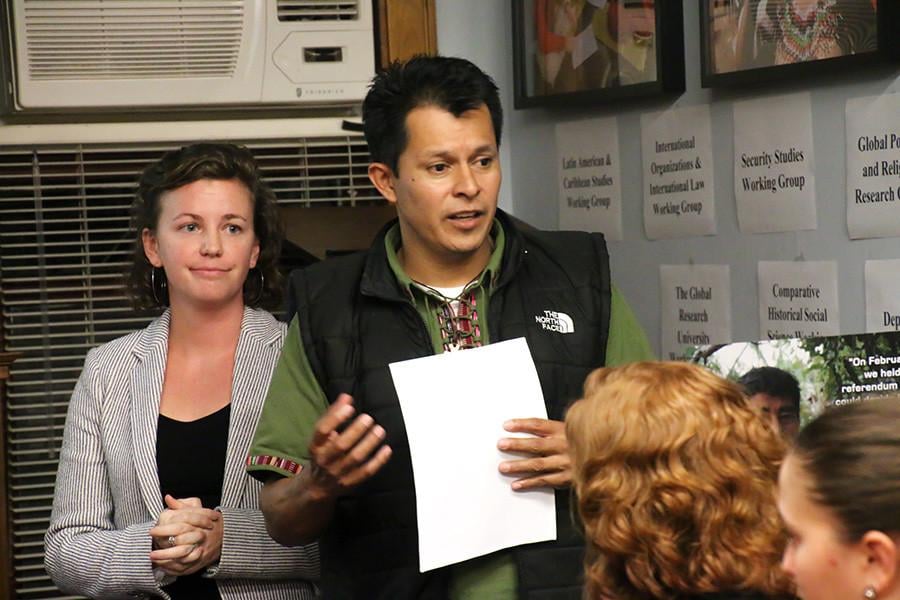Human rights in Guatemala highlighted in Buffett event
Drew Gerber/ The Daily Northwestern
Llan Carlos Dávila (right) speaks about his experiences protesting against transnational mining company Tahoe Resources, which he said posed environmental risks and infringed upon human rights in Guatemala. The event was hosted by the Buffett Institute on Thursday night.
October 16, 2015
A Guatemalan activist came to Northwestern Thursday night to speak on his struggle against his nation’s government and mining companies regarding human rights.
Llan Carlos Dávila, mayor of the municipality of Santa Rosa de Lima in southeastern Guatemala, spoke on his experiences peacefully protesting against Tahoe Resources, an American and Canadian company that has installed chemical mineral mines on the land of Guatemalans against their will, according to the presentation. Dávila spoke in Spanish at the event, which was co-hosted by the Buffett Institute and NU Community for Human Rights.
Ellen Moore, Guatemala programs coordinator at the Network in Solidarity with the People of Guatemala, translated his message to English.
In his presentation, Davila said Tahoe Resources, which has 24 mining licenses in the Guatemalan regions of Santa Rosa, Jalapa and Jutiapa, paid the Guatemalan government royalties to operate freely. After initially saying it would plant avocado trees, Tahoe Resources built a mine right next to the community of San Rafael las Flores, creating serious environmental and health issues, he said.
Dávila said Tahoe Resources has been dumping water from mining operations into nearby streams, increasing the levels of heavy metals and chemicals in the water. This has contaminated the water along which people plant crops and in which animals drink all along the riverbanks, he said. This contamination of water has in turn contaminated the air and put the people of Santa Rosa de Lima at risk of skin disease, he added.
“The interests of a few have been thought to be more important than bringing well-being to the whole community,” Dávila said.
These concerns led to the creation of the Diocesan Committee in Defense of Nature, a movement to protect human rights against mining companies, according to the NISGUA website. The organization works to speak out against these companies, as well as expose government corruption in mining practices.
Dávila also spoke of an instance in which his fellow community leaders were arrested for peacefully protesting. Since this is a constitutional right in Guatemala, they were released after three days as they could not be charged with anything.
NUCHR co-director Melody Song, a former Daily staffer, said the focus of the group’s annual conference this year is corporate social responsibility, which she said ties in perfectly with the message of Dávila’s talk.
“During our conference in January we’ll actually be doing kind of some case studies with delegates about conflict minerals,” Song said. “Right now it’s not necessarily geographically focused, but it’s an issue that we want to talk about and it’s a major global problem.”
Weinberg junior Alex Kirschner was one of about 25 people in attendance at the event. While he said he did not know much about the issue before, he left with a good understanding and is interested in learning more.
“Of course international pressure will help, but inside the country of Guatemala, there needs to be a cohesive social movement that either represents mining, or mining as well as other human rights issues, to really pressure the government to making the change that Guatemalans need to correct these issues,” Kirschner said.
Moore told The Daily she hopes students left with a deeper understanding of the impact U.S. companies are having when they push forward large-scale development projects without the consent of people living in the communities.
“If nothing else, I think the other really strong message that Llan Carlos has to share is the power of community organization and the power of unity, and what can be gained when people come together for a common cause,” Moore said.
Correction: A previous version of this story misidentified which community a mine was built near. The mine was built near San Rafael las Flores.
Email: [email protected]
Twitter: @kelleyczajka


